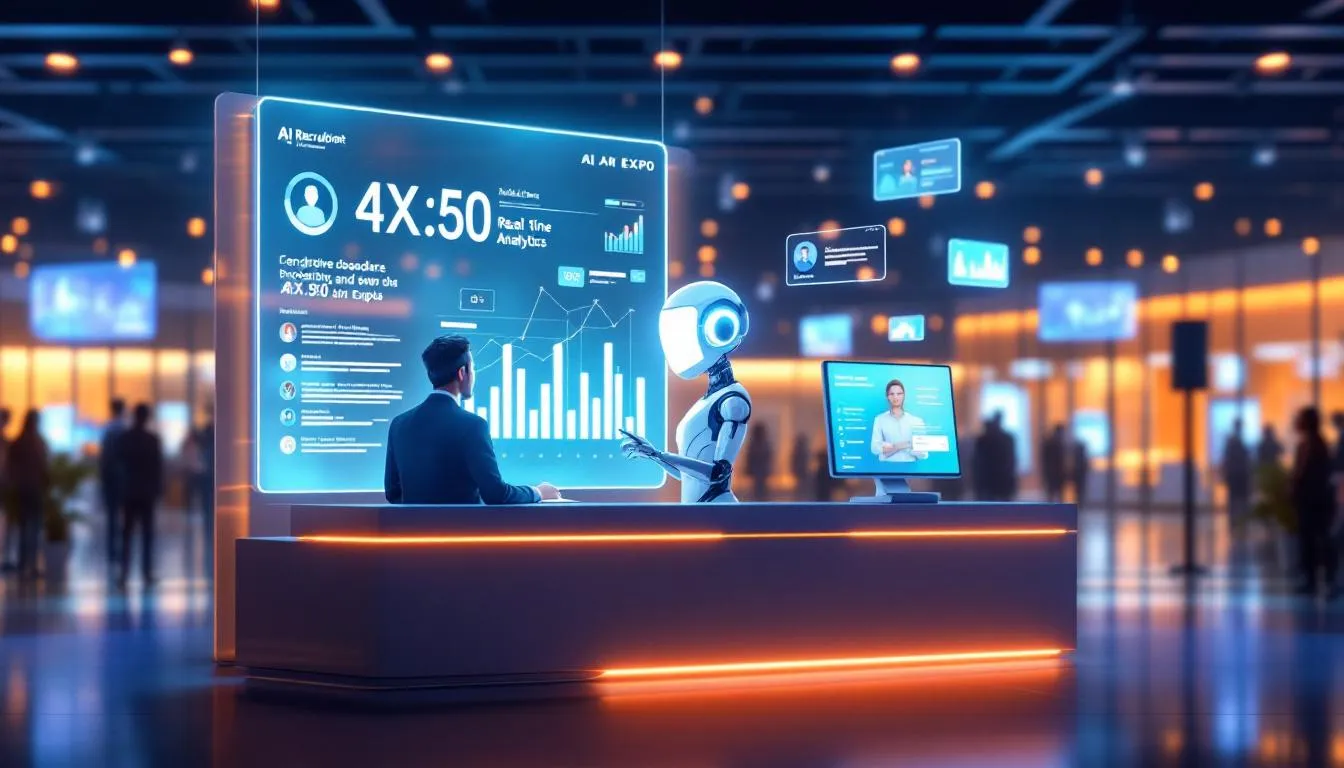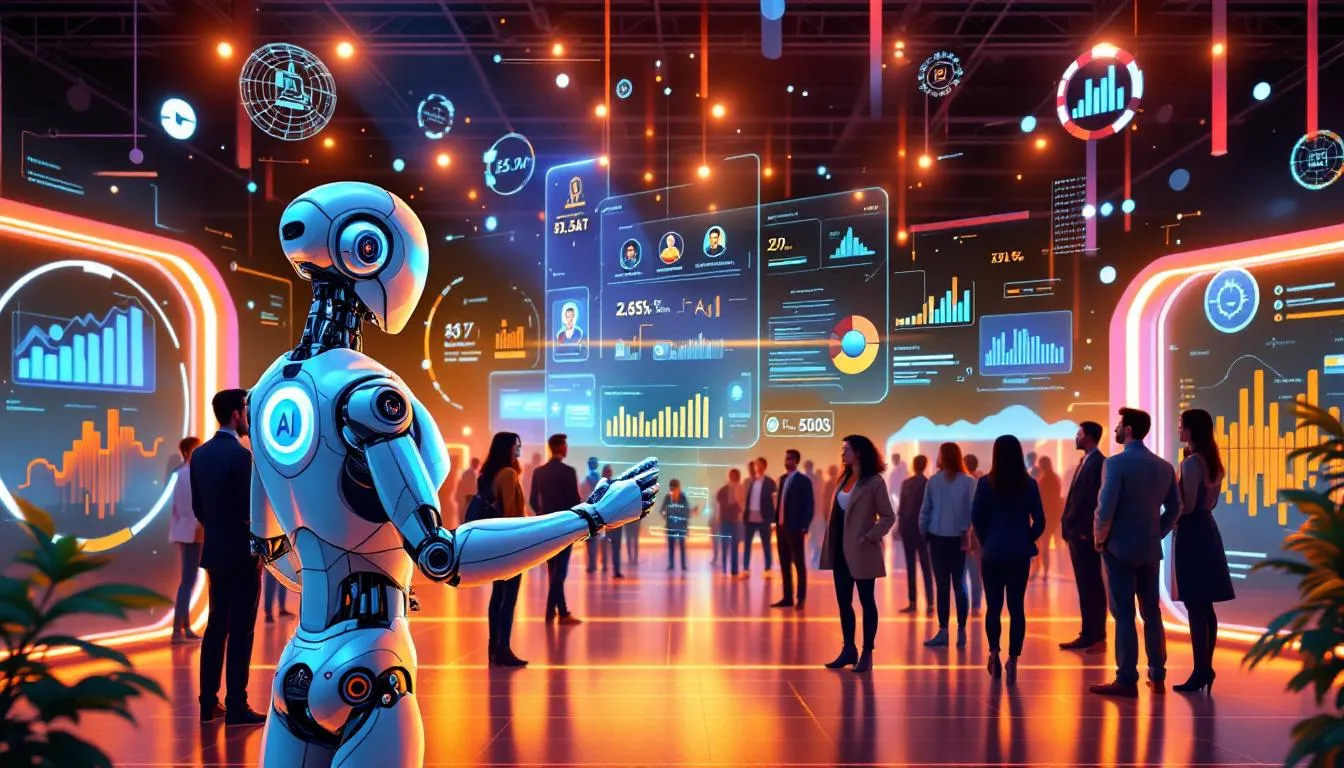The Comprehensive 2025 Guide to AI in Recruitment: Boost Efficiency and Improve Hires
AI in recruitment is changing how companies hire by automating tasks like resume screening and candidate matching. This technology helps HR teams work more efficiently and make better hiring decisions.
In this article, we explore the impact of AI on recruitment, its benefits, and key tools you can use.
Key Takeaways
- AI streamlines the recruitment process by automating tasks such as sourcing and screening, enabling HR professionals to focus on strategic initiatives and enhance candidate engagement.
- Integrating AI tools improves hiring accuracy, reduces costs, and minimizes human bias by ensuring that decisions are data-driven, thus promoting diversity in recruitment.
- Future trends such as generative AI and AI agents are set to further transform recruitment practices by personalizing candidate interactions and automating complex tasks, leading to more efficient hiring processes.
Understanding AI in Recruitment

AI is fundamentally transforming the recruitment process by automating and enhancing various hiring tasks.
The application of AI in talent acquisition ai encompasses technology-driven solutions for sourcing, screening, and hiring employees, dramatically improving the efficiency of recruitment processes. The automation capabilities of AI reduce labor-intensive tasks, allowing HR professionals to focus on more strategic initiatives.
This shift enables faster and smarter talent acquisition, transforming the talent acquisition process from a reactive to a proactive strategy.
The role of the hr team is evolving with AI’s influence. AI tools free HR from manual tasks, allowing them to engage more meaningfully with candidates. This not only improves the candidate experience but also reshapes how HR professionals attract, engage, and retain talent.
Through AI, the recruitment process becomes more efficient, cost-effective, and capable of delivering better outcomes in human resources.
The Role of Artificial Intelligence in Recruitment
AI serves as a powerful tool for enhancing and automating various recruitment tasks, significantly improving the recruitment process. For instance, AI can:
- Quickly match applicants’ skills and experiences with job requirements, ensuring that hiring managers find the best candidates faster.
- Help organizations streamline workflows.
- Reduce costs.
- Improve hiring precision.
Furthermore, AI assists in evaluating candidate profiles by analyzing public information, such as social media, and providing insights on market trends and suggestions based on cloud data. This allows human recruiters to make more informed decisions and continually assess and adjust their talent pools.
The integration of AI tools in recruitment not only enhances efficiency but also supports strategic recruitment strategy talent acquisition efforts.
Machine Learning vs. AI: What Recruiters Need to Know
Artificial intelligence encompasses a wide range of intelligent behaviors, including those that mimic human-like decision-making and problem-solving skills. Machine learning is a subset of AI.
It teaches systems to learn from data and enhance their performance without the need for explicit programming. Understanding this distinction is crucial for recruiters to effectively leverage AI and machine learning in their hiring processes.
In the context of recruitment, AI can perform tasks such as resume screening and candidate matching, while machine learning improves these processes by continually learning from new data.
Integrating AI tools into recruitment strategies allows organizations to enhance their hiring outcomes and stay competitive in the talent acquisition landscape.
How Natural Language Processing Enhances Recruitment
Natural Language Processing (NLP) technology plays a pivotal role in enhancing the recruitment process. NLP helps create job descriptions that align with business goals to match job descriptions, ensuring job postings attract the right candidates.
Moreover, AI systems equipped with NLP can assist in writing job descriptions that eliminate biased language, thus promoting diversity and inclusivity in the applicant pool.
NLP also improves candidate engagement by facilitating more meaningful interactions during the hiring process. This technology helps HR professionals create compelling job descriptions and personalized job recommendations, ensuring a smoother and more engaging recruitment experience for job seekers.
Benefits of Using AI in Recruitment

The benefits of integrating AI into recruitment processes are manifold:
- AI technologies offer substantial efficiency improvements and cost reductions, significantly reducing the time to fill job positions.
- AI-driven talent acquisition reduces the time needed to find, assess, and hire top prospects by automating tasks like candidate sourcing and scheduling.
- This leads to a more streamlined and effective recruitment process, allowing organizations to engage talent earlier and more meaningfully.
Furthermore, AI improves candidate communication and expands the reach to diverse talent pools. This high-level personalization and data-driven insights enable better recruiting decisions, helping employers maximize their recruitment strategies.
The following subsections will delve deeper into specific benefits and many benefits provided by AI in recruitment.
Automating Administrative Tasks
AI significantly reduces the time spent on recruitment by automating repetitive and time-consuming tasks such as screening resumes and scheduling interviews.
This automation allows recruiters to focus on more strategic relationship-building activities, enhancing overall recruitment efficiency. AI tools automate routine tasks, freeing valuable time for HR professionals to engage more deeply with candidates and enhance the hiring process.
The comprehensive implementation of AI can vastly improve recruitment efficiency, leading to faster and better hiring outcomes.
As a result, organizations can expect to see a reduction in time-to-hire and an increase in the quality of hires, ultimately benefiting their business outcomes.
Improving Candidate Matching
AI tools excel at filtering candidates by their qualifications and skills, ensuring a better match with job requirements.
AI-powered resume screening enhances candidate matching by analyzing and ranking candidates based on job specifications. This precision in matching relevant candidates leads to an overall improvement in the quality of hires.
Chatbots can also conduct initial screenings by asking candidates specific questions related to their qualifications, further refining the candidate’s skills and the candidate pool for prospective employees.
The screening process, along with predictive analytics, plays a crucial role in identifying potential candidates by analyzing historical hiring data, leading to better decision-making in the recruitment process to assess candidates.
These AI tools collectively enhance the efficiency and accuracy of candidate matching, benefiting both enabling recruiters and job seekers through ai powered tools.
Reducing Human Bias
One of the significant advantages of using AI in recruitment is its ability to reduce unconscious bias. AI tools grade candidates based solely on their skills and experience, minimizing the influence of demographic factors. This approach ensures that hiring decisions are based on objective data, leading to fairer and more inclusive recruitment outcomes.
Minimizing unconscious bias with AI appeals to a wider large applicant pool and promotes workforce diversity. Organizations must ensure that their AI recruitment systems are free from bias to effectively identify diverse candidates and improve overall decision-making in the hiring process.
Key AI Tools for Recruitment

The integration of AI in recruitment is rapidly increasing, with a significant number of organizations actively experimenting with generative AI tools.
AI recruiting tools streamline candidate sourcing, automate screening, and enhance hiring decisions, offering functionalities such as personalization, intelligent search, and conversational HR chatbots throughout the recruitment process.
Some of the top AI recruiting tools include Oleeo and Workable, which offer comprehensive recruitment functionalities and integrate various HR capabilities. Coordination between the executive team, IT teams, and HR staff is essential to identify and implement the best AI tools, ensuring successful AI implementation in recruitment.
AI-Powered Resume Screening
AI tools and recruitment software offer several advantages in the hiring process:
- AI tools can quickly analyze resumes, recognizing keywords and experiences, significantly speeding up candidate shortlisting.
- Recruiting software and recruiting software automatically ranks, grades, and shortlists candidates based on their skills and experiences, leading to more efficient and accurate screening processes.
- These technologies save time for human recruiters.
- They improve the overall quality of hires.
Effective AI screening requires a significant amount of training data to optimize its performance. Analyzing resumes from previous applications allows AI tools to continually improve their accuracy and effectiveness, ensuring the identification of the most qualified candidates for each job opening.
Chatbots for Candidate Engagement
Chatbots deliver personalized experiences for candidates at scale, ensuring that each interaction is tailored to individual needs. AI-driven chatbots, like Talent Companion, offer the following benefits:
- Guide candidates through each step of the job application process
- Provide real-time responses, enhancing overall candidate engagement
- Handle initial candidate interactions
- Answer FAQs
- Conduct pre-screening assessments
These functions significantly cut down on manual data entry and improve communication.
Candidates who interacted with recruitment chatbots reported a satisfaction rate of 99.3%. Improved messaging and personalized interactions facilitated by chatbots lead to better overall candidate experiences, making the hiring process more efficient and enjoyable for job seekers.
Predictive Analytics for Talent Acquisition
Predictive analytics is revolutionizing talent acquisition by providing insights that can significantly improve hiring strategies.
Predictive analytics helps HR teams make more informed decisions by predicting candidate success, assessing cultural fit, and suggesting upskilling opportunities. This technology future-proofs recruiting strategies and ensures that organizations stay ahead in the competitive talent market.
Utilizing predictive analytics allows organizations to understand shifting candidate preferences and tailor their recruitment strategies accordingly. This leads to better alignment with business goals and more effective talent acquisition processes.
Challenges and Considerations in AI Recruitment

Integrating AI into recruitment processes presents several challenges and considerations. While AI offers numerous benefits, it is not suitable for every business context and cannot replicate the human judgment crucial in recruitment.
Organizations must treat AI as an enhancement to recruitment practices rather than a complete replacement, ensuring continuous assessment of AI processes.
A shift towards a data-driven approach is necessary for successful AI implementation in recruitment strategies.
However, AI technology can sometimes overlook critical insights that a human recruiter would typically provide, emphasizing the importance of maintaining human oversight and ethical considerations.
Ensuring Data Quality
High-quality data is crucial for the effectiveness of AI systems, as it directly impacts their performance and decision-making accuracy. The quality of AI’s decision-making is heavily influenced by the underlying data used for training. Therefore, organizations must ensure that the data fed into AI systems is accurate, reliable, and free from biases.
Many AI resume screening tools are designed to work with various formats and styles of resumes, showcasing their versatility. However, specialized positions with few applicants require carefully selected training data to maintain the efficiency and accuracy of AI processes.
Maintaining Human Oversight
Human recruiters play a crucial role in verifying AI outputs to maintain alignment with recruitment objectives.
Human oversight is necessary to verify AI suggestions and correct any potential errors, ensuring hiring goals are met. In AI screening processes, good candidates may be unfairly rejected, and poor candidates may be favored, which highlights the importance of human intervention.
Organizations should analyze the results of any new AI enhancement to ensure alignment with their hiring goals. This collaborative approach ensures that AI tools complement rather than replace human judgment in the recruitment process.
Addressing Legal and Ethical Concerns
Organizations must consider the following before adopting AI in their recruitment processes:
- Responsible AI concepts and the legal, ethical, and reputational ramifications.
- The risk of AI replicating human biases if training data contains biased patterns, making it crucial to use trusted AI providers to mitigate these biases.
- Proactively communicating the use of AI in hiring to build trust with candidates and ensure transparency in the recruitment process.
Additionally, AI tools can assist organizations in tracking diversity metrics and identifying areas for improvement in candidate treatment and inclusion efforts. By addressing these legal and ethical considerations, organizations can ensure a fair and transparent recruitment process that fosters diversity and inclusion.
Successful AI Implementation in Recruitment
Successful AI implementation in recruitment aims to improve efficiency, enhance candidate experience, and aid decision-making. A strategic approach is essential for integrating AI into recruitment processes effectively. Several companies have utilized AI and automation to improve their hiring processes, demonstrating the potential benefits of AI in recruitment.
Maintaining human interaction is also crucial. For example, Korn Ferry offers a phone line for candidate inquiries to keep the human touch in recruitment. The following case studies illustrate successful AI implementation in real-world scenarios and highlight the benefits achieved.
Case Study 1: Enhancing Efficiency at Company X
Intuit, which hires over 6,000 employees annually, faced the challenge of managing a high-volume recruitment process. Intuit implemented an AI software solution for screening video interviews to enhance its interview process and reduce hiring costs.
This integration significantly reduced their time-to-hire rate to under 30 days, showcasing the efficiency benefits of AI tools and allowing them to schedule interviews more effectively.
The use of AI allowed Intuit to streamline their hiring process, reduce administrative burdens, and focus on engaging with the most qualified candidates. This case study demonstrates how AI can transform recruitment efficiency and lead to better business outcomes.
Case Study 2: Promoting Diversity at Company Y
Thirdlove utilized AI technology, specifically Ai4JOBS, to enhance their hiring process by focusing on candidates’ skills and qualifications, significantly promoting workforce diversity. The AI-driven recruitment process enabled Thirdlove to reduce their average time-to-hire from 45 days to just 14 days.
By integrating Ai4JOBS with their applicant tracking system, Thirdlove was able to rank candidates objectively, eliminating biases in the hiring process. This approach highlights the impact of AI in promoting diversity and improving hiring efficiency.
Other companies, like Google and Microsoft, also use AI to eliminate biases and identify diverse candidates, further illustrating AI’s potential in enhancing recruitment practices.
Future Trends in AI Recruitment

Emerging trends in AI recruitment are set to transform the hiring landscape, with innovative applications of technology leading the way. The rise of generative AI allows for creating personalized content that enhances candidate engagement, making the recruitment process more tailored and effective.
AI agents are also being employed to automate complex tasks within the recruitment process, supporting HR teams by streamlining operations and enhancing overall efficiency.
These trends highlight the ongoing evolution of AI in recruitment technology, paving the way for improved hiring practices and a more dynamic workforce. As organizations continue to explore and adopt these technologies, the near future of recruitment looks promising and full of potential.
The Rise of Generative AI
Generative AI provides capabilities such as creating personalized outreach messages, job descriptions, and interview questions, enhancing candidate engagement at scale.
Unlike traditional AI, which analyzes and optimizes data, generative AI focuses on creating content, making it a powerful tool for recruitment. This technology assists HR professionals in making quicker decisions and responding effectively to challenging employee questions.
A recommended approach for organizations utilizing generative AI tools is to build or license industry-specific generative AI tools. By doing so, organizations can ensure that their recruitment strategies are tailored to their specific needs and can provide a more personalized candidate experience.
AI Agents and Their Impact
AI agents are capable of reasoning, acting, and collaborating across the best talent lifecycle, completing tasks, anticipating challenges, and improving accuracy in recruitment.
Phenom X+, for example, utilizes X+ Ontologies as its framework for AI models, demonstrating the advanced capabilities of these tools. These AI agents support HR teams by automating complex tasks and enhancing overall recruitment efficiency.
The impact of AI agents on recruitment is profound, offering a glimpse into the future of talent acquisition. As these technologies continue to evolve, they will play an increasingly significant role in shaping recruitment strategies and improving hiring outcomes.
How Loopcv for recruiters work
There is a list of the features that Loopcv for Recruiters provides:
1) Automated lead generation: Effortlessly identify companies actively hiring and reach out to them automatically, turning them into new clients for your recruitment business.
2) Intelligent candidate sourcing: Quickly find candidates who perfectly match your open roles and engage with them automatically, saving time and accelerating your hiring process.
3) Seamless calendar integration: Sync your calendar to display your availability, create your daily meeting agenda, and coordinate interviews with candidates and clients effortlessly.
4) AI-powered talent pipelines: Leverage our proprietary AI algorithms to match your open roles with job-seeking candidates, engage with them proactively, and streamline your applicant tracking and daily recruitment operations.
5) Automated job posting: Post your job openings across multiple job boards and sites through our integrations, ensuring maximum exposure and a steady flow of applications.
6) Advanced data enrichment: Enhance candidate profiles with smart integrations to LinkedIn, GitHub, and other social platforms, giving you a comprehensive view of their skills and experience.
7) Custom branded website & career page: Easily build a professional, branded website displaying your open roles—with options to anonymize employer names—so you can strengthen your agency’s brand and attract top talent.
8) Integrated recruitment CRM: Track all your commercial activities, candidate placements, and revenue in one centralized platform to stay organized and maximize productivity.
9) AI-driven reporting & analytics: Access powerful insights to identify your most profitable roles, monitor key performance indicators (KPIs), and make data-driven decisions to grow your recruitment business.
Frequently Asked Questions
1. How does AI improve the efficiency of the recruitment process?
AI enhances the efficiency of the recruitment process by automating repetitive tasks like resume screening and interview scheduling, enabling recruiters to concentrate on more strategic activities and significantly reducing time-to-hire.
2. What is the difference between AI and machine learning in recruitment?
The difference between AI and machine learning in recruitment lies in their scope; AI refers to the broader concept of machines performing tasks intelligently, whereas machine learning specifically involves algorithms that learn from data to enhance their performance in recruitment processes.
3. How does natural language processing (NLP) enhance recruitment?
NLP enhances recruitment by enabling the creation of unbiased job descriptions and improving candidate engagement, thereby facilitating more meaningful interactions throughout the hiring process. This leads to a more efficient and equitable recruitment experience.
4. What are the key challenges in implementing AI in recruitment?
The key challenges in implementing AI in recruitment involve ensuring data quality, maintaining necessary human oversight, and addressing legal and ethical concerns. These factors are crucial for successful integration and functionality.
5. What are some examples of successful AI implementation in recruitment?
Successful AI implementation in recruitment includes Intuit's use of AI for efficient screening of video interviews and Thirdlove's application of AI to prioritize diversity by emphasizing candidates' skills and qualifications.



